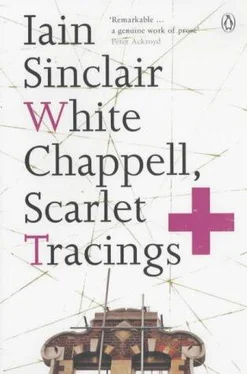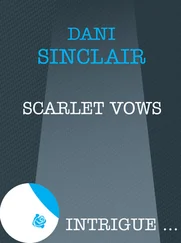‘Spewed up his ring,’ thought the narrator, a phrase picked up in Walthamstow, of uncertain meaning, but strong displacement. ‘Spewed up his ring.’
Recorded violence and actual violence mix, faked blows and authentic shuddering of violated flesh: they head gratefully for the car, each with his secret triumph of books.
The car is waiting for them, useless. They stand around it, unable to get in, or on; Jamie in sleep, his head upon the bar-room table.
The windows of the bar are mercifully frosted, keeping out all sight of the stone walls, this sandblasted town. Jamie wakes and fumbles for one of Nicholas Lane’s cigarettes. He has a lighter but it doesn’t work. There never was a case-hardened smoker who had a match. They measure out their days in bumming lights. Never was a true nicotine junkie who had a watch. It would be superfluous: they can weigh time in their craving for the burnt tongue, a lick of old ashtrays.
Dryfeld having flung his purchases into the holdall has no interest in examining them. He’s made his phone call. They’re sold. He’ll have his money before dawn and be on the Penzance train by breakfast-time. A bundle of still crisp newspapers.
He starts scribbling in the ring folder. His handwriting has been accurately described as looking like ‘poor quality knitting’. It has the advantage of being unreadable, even to him.
And though he can’t do two things at once he does them so closely together that they blend into one crumb-spattered shuffle. He writes, frowning, lips moving, breaks off, devours, tears up a plate of thick-cut cheese sandwiches. The virulent orange grains of moistened cheese rolling out of the corners of his mouth, generous beads of milky spittle. Savage vegan.
The narrator’s books are bagged also. And of no further interest. Once bought he’d sell them to anyone, for anything; preferably several times over. They are the stigmata of guilt, the visible sign that he remains in this tawdry profession: he does not have the spirit, yet, to be proud of these fine and active corruptions. Ancient pretensions glaze him into a sour inertia.
Nicholas Lane, concentrated, subdues the circling vortex of pain drilling into his gut; the true enthusiast. The warrior-knight who dredges up grail treasures out of the dead land, himself dying from open wounds. Gone in the teeth, but brilliant in eye and finger.
He knows that pain is life: every twist and bite flashes another synapse, a connection burns out, keeping his edge sharp. He unstrings the bundle of old papers. Throws back a brandy, hitting the ulcer wound like a shot of salt.
The first point he can reveal is that the outer wrappings bear no direct relation to the contents. A Penny Story, Out in the Wide World by Fannie Eden, fetching cover illustration of wistful young lady, Chatterton in drag, standing outside her attic window looking across the roofs of the city to the unfocused distance of St Paul’s and the sister churches, proves on closer examination to contain two sheets of prophetic millennial rantings pasted over a remnant of the original text.
‘“Master, master,” she cried out, “there’s a villain of a Jew gone up into that picture-place upstairs! He says as how the awful looking pictur’ belongs to him ’cause he lent the gentleman money on it, and he is carrying it away.”
Molly started up with a cry of dismay .
“Hush, Molly, do not trouble yourself! There must be some mistake,” Dr Maitland said. “Stay here, and I will see this Jew fellow,” and he turned and left her.’
A number of other yarns, involving tigers, boat races, abandoned waifs, bearded card-players, were left naked with no cover, no illustrations, no advertisements.
Some covers had been recklessly taped to quite alien interiors, some fixed with rubber solution into brown wrappings. But it had been the name of Beeton’s Christmas Annual and the search for the magic date, 1887, that had settled the purchase for Nicholas Lane.
There were copies; but they were split and scattered. Taped into a romance by H. Fitzgerald entitled Madeline’s Temptation was what appeared to be some version of the legendary Christmas Annual with the first printing of the first appearance of Sherlock Holmes, A Study in Scarlet .
The covers had gone, there were some annotations to the text. The date ‘1878’ had been altered to ‘1888’. The word ‘Nettley’ had been altered to ‘Netley’. Nicholas Lane paused to flick a globe of dry white spittle from his lips.
‘At worst,’ he said, ‘a variant. At best, a unique issue. A trial copy, or a proof of some kind. It could be the book that Ward Lock intended to publish, mentioned in Beeton’s Annual, but which has never been located.’
‘How much?’ enquired the always direct Mr Dryfeld.
‘Ten to twenty. Grand. Plus.’
Jamie woke with a spastic jerk, spilling the dregs of his whisky over the pages, which Nicholas Lane mopped frantically with an indescribable handkerchief. He ran out, now, his last long-reserved line, and snorted, while Jamie gazed on, waiting, unsuccessfully, for the invitation to take a brotherly poke.
‘Twenty grand, up. Way up, if it comes to auction in New York.’
The febrile and inhumanly sharpened and quickened brain of Nicholas Lane had perfect recall of every catalogue, article, book he had ever had through his hands. ‘Nettley’ was a spelling that didn’t exist in any known version of the text. He had, once again, uncovered a piece of history, a true splinter of the 1880s. And this was it, this was the big one, the white whale, the reason why we’re all in the game: he’d brought it in, finally, the ultimate score. And it was for sale.
Once Dryfeld had found the Department of Health and Social Security and shoved his anonymous document denouncing Mossy for child-abuse through the letterbox there was nothing else to do. They had burnt this place to the ground, there were other places to look for.
A wharfinger is a man of business, and eats accordingly. John Gull, Senior, his back to the land, attended to his breakfast with a severe and methodical concentration. He did not make two cuts where one cut would serve. Even the flesh of swine could be brought to use, divided in moral symmetry, tasted, swallowed, the worthy elements put to work, the worthless burnt in the stomach’s pit, stamped down, expelled: the sheep parted from the goats.
His great head like a trophy, unmoving, eyes fixed on the panels of his door, as if waiting for the day’s commandments to appear there; while, secretly, his hands served him, as his children did, his wife, his labourers. These hands, set off by starched cuffs, were honourably blackened, the nails broken; he was not too proud to exercise his talents, his pride was in the sweat of his brow.
His fist, like a pale crab, went among the warmed meats, slither of kidney, liver, blood-sausage, layered on thick muscular segments of potato. He chewed vigorously, exercising an already powerful jaw; animal fires became his fires. There was no pleasure of the senses in this. Work was life, life was work. ‘ Blessed is he who has found his work .’ The weak must serve the strong, and be protected, as children served their parents, as women served men, as men served God: that savage and wonderful darkness.
His strong square teeth split the eye of an egg, squeezing the unfertilized life onto his tongue. He nodded assent as his wife, Elizabeth, lifted the kettle from the hob and brought it to him for his final cup.
He drowned the well-mashed food with scalding fern-water tea.
Young William watched him. The child was silent as the man. His stillness remarkable, utterly contained, acknowledged by his father, who allowed him to remain, standing, his chin at the edge of the table.
Читать дальше












